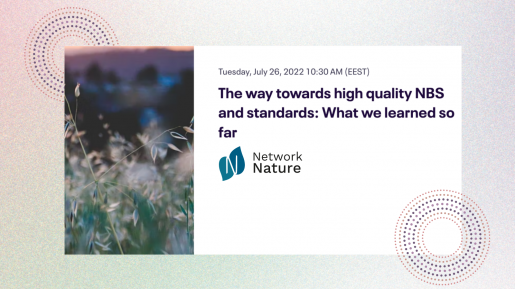Insights from NetworkNature’s workshop: How important is standardisation of NbS?
On July 26, 2022 Network Nature hosted an online workshop titled “The way towards high quality NbS and standards: What we learned so far”. The theme of the workshop focused on the standardisation processes of nature-based solutions (NbS) and their quality assessment.
NetworkNature is an umbrella project and a resource for the NbS community, which aims to bridge the European policy landscape and the NbS community and to maximise the impact and spread of NbS through strengthening its evidence base, engaging with stakeholders, and thus accelerating NbS uptake.
The workshop featured a panel of experts from The International Union for Conservation of Nature (IUCN), Local Governments for Sustainability (ICLEI), as well as the coordination team of NetworkNature.
The discussion centred on the principles and criteria of assessing high-quality NbS. By identifying the knowledge gaps, potential misuse, expected results of implementation, and effective impact, NbS quality can be better ascertained. The quality criteria can be divided into five themes: objectives, design, feasibility, implementation, and post-implementation.
Misuses such as land grabs or displacements, carbon or biodiversity offsets, greenwashing, gentrification, or overlooking indigenous groups’ or gender equality rights can all be avoided through coherent standardisation.
Standardisation of NbS is crucial for ensuring its smooth implementation to diverse contexts as it points to a range of best practices that have been tested. This creates a more secure implementation process that yields successful results. Research institutions, society needs, and stakeholders are all consulted in the standardisation process. Standards include, for example, the ISO/TC 207 Environmental management, ISO/TC 268 Sustainable cities and communities, SF-SSCC Sector Forum Smart and Sustainable Cities and Communities, IUCN Global Standard for Nature-based Solutions, etc.
The workshop presented a questionnaire conducted by NetworkNature assessing the importance of various quality criteria and the relevance of NbS misuses. The results point to the fact that participants deem post-implementation and maintenance of NbS in the long-term as the most important aspects together with context-specific applicability and contribution of societal benefits. The questionnaire further points to the most serious misuses of NbS being in greenwashing, biodiversity offsets, and land grabs and displacement.
The workshop concluded with a selection of good practice examples from across Europe and the Americas - Milan, Hamburg, Oslo, Rosario as well as Boston - one of NICHES’ case study cities. The Porous Alley Demonstration Project in Boston, USA, which consists of a strip of porous asphalt in a public alley aimed at filtering stormwater and managing runoff in one of Boston’s neighbourhoods. The project was designed and implemented as a demonstration project to test the feasibility of using porous asphalt to increase groundwater recharge and reduce flooding and water pollution. The implementation of the project only began after coordination of public meetings, where local citizens were consulted.
Learn more about the workshop here.
